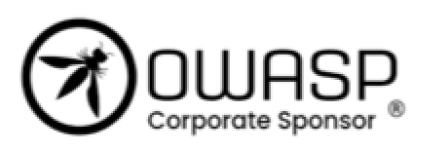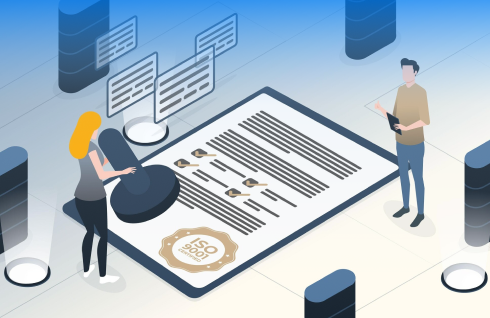
In today’s software development landscape, the use of open-source software (OSS) is ubiquitous. Open-source components allow developers to innovate quickly by building on the work of others, leading to faster time-to-market and reduced development costs. However, the widespread use of OSS also introduces the challenge of managing and ensuring compliance with the licenses associated with these components. Failing to comply with OSS licenses can result in legal risks, including fines, litigation, and reputational damage. This is where tools like Cryptosoft’s OWASP® Dependency-Track Managed Service come into play.
Understanding the Importance of the OSS License
Open-source licenses define how software can be used, modified, and distributed. They range from permissive licenses, like the MIT or Apache 2.0 licenses, which impose minimal restrictions, to copyleft licenses, like the GPL, which require derivative works to also be open source. Ensuring compliance with these licenses is crucial for organizations that rely on open-source software, as non-compliance can lead to serious legal and financial consequences.
What is OWASP® Dependency-Track?
Dependency-Track is an open-source tool that helps organizations identify and mitigate risks in their software supply chain, including those related to OSS license compliance. It continuously monitors the components within your software projects, providing visibility into the licenses of the open-source libraries you’re using. Dependency-Track integrates seamlessly into your CI/CD pipeline, making it easier to manage and comply with OSS licenses throughout the software development lifecycle. Cryptosoft provides a private managed service of the tool enabling you to get productive quickly.
Key Features of Dependency-Track for License Compliance
License Policy Management
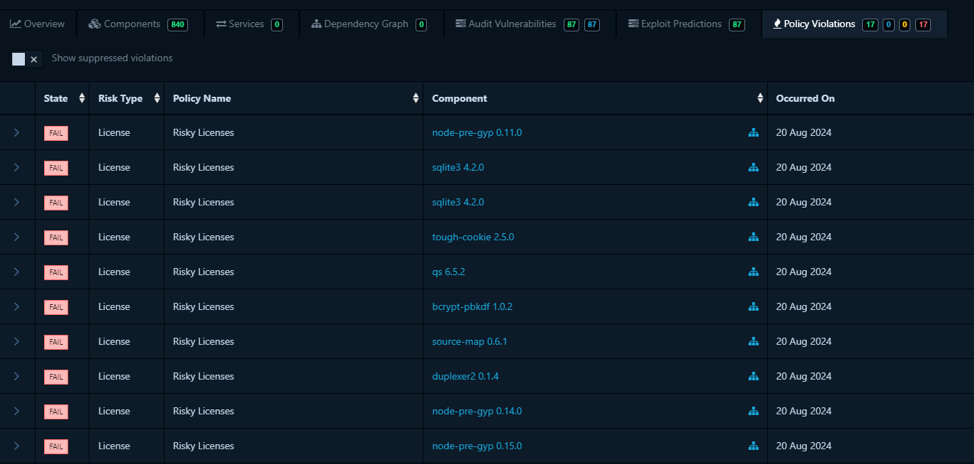
Organizations can define custom license policies within Dependency-Track. These policies allow you to specify which licenses are acceptable for use in your projects and which are not. For example, you might choose to prohibit the use of GPL-licensed components in commercial projects. Dependency-Track will then alert you if a non-compliant license is detected.
Continuous Monitoring and Alerts
Dependency-Track continuously monitors your software projects for changes in dependencies and their licenses. If a new component with a non-compliant license is introduced, or if the license of an existing component changes, Dependency-Track will notify you immediately. This real-time monitoring helps prevent license compliance issues before they escalate.
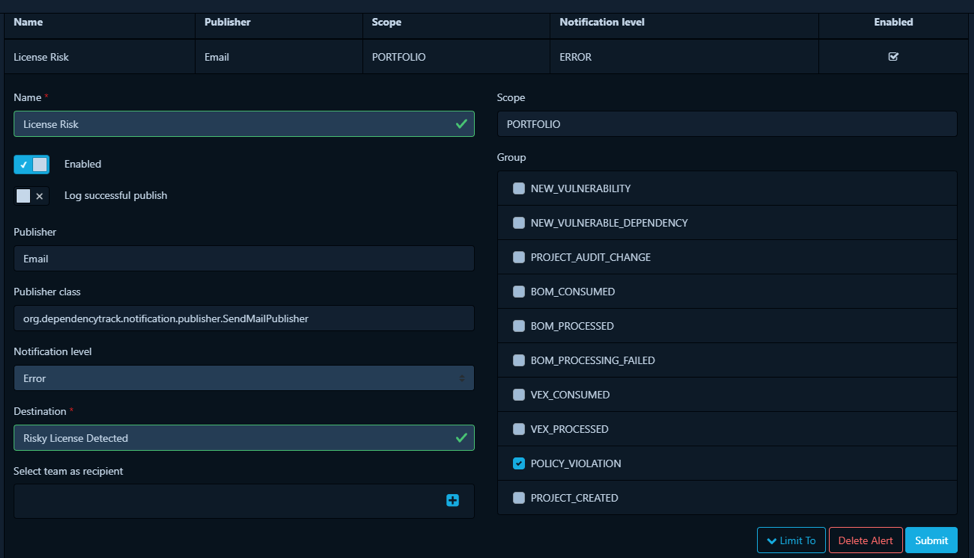
Default License Groups
Dependency-Track categorizes licenses into four predefined groups, making it easier for organizations to manage and comply with various license types:
Copyleft: These licenses, such as the GPL, require derivative works to also be open source, imposing stricter redistribution requirements.
Non-Commercial: Licenses in this group, like Creative Commons Non-Commercial, restrict the use of the software for commercial purposes.
Permissive: This group includes licenses like the MIT and Apache 2.0, which impose minimal restrictions on how the software can be used, modified, and redistributed.
Weak Copyleft: Licenses in this group, such as the LGPL, require that modifications to the licensed code be open source, but do not impose the same restrictions on other components linked with it.
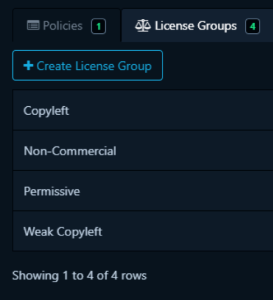
Steps to Ensure OSS License Compliance with Dependency-Track
1. Integrate Dependency-Track into Your Development Pipeline:
Start by integrating Dependency-Track into your CI/CD pipeline. This ensures that license compliance checks are performed automatically every time new code is committed or deployed by pushing the latest SBOM to Dependency-Track.
2. Define Your License Policies:
Work with your legal and compliance teams to define acceptable and unacceptable licenses for your projects. Configure these policies in Dependency-Track to automate license compliance checks.
3. Monitor and Respond to Alerts:
Regularly monitor Dependency-Track for any alerts related to non-compliant licenses. Ensure that your team addresses these issues promptly to maintain compliance.
4. Keep Your SBOMs Up-to-Date:
Regularly update your SBOMs to reflect the current state of your software projects. Dependency Track makes this easy by automatically generating SBOMs that include license information as part of the CI/CD pipeline.
Conclusion
Ensuring OSS license compliance is a critical aspect of modern software development, particularly as the use of open-source components continues to grow. Dependency-Track provides a powerful and automated solution for managing OSS license compliance, helping organizations mitigate legal risks and maintain trust with customers and stakeholders. By integrating Dependency-Track into your development process, you can ensure that your software projects remain compliant with all relevant licenses, allowing you to focus on innovation and growth.
As open-source continues to play a pivotal role in the software industry, tools like Dependency-Track are essential for maintaining compliance and avoiding the potential pitfalls associated with OSS licenses. Whether you are a small startup or a large enterprise, Dependency-Track can help you navigate the complexities of OSS license management with confidence. Cryptosoft offers a managed service version of Dependency-Track to provide you with a fast, cost-effective implementation. Please check out our website for more information. All our plans come with a free, one month no obligation trial.
